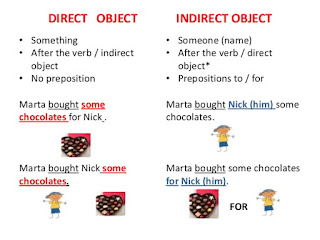PRESENT PROGRESSIVE AS FUTURE
PRESENT PROGRESSIVE AS FUTURE
Ø FUNCTION:
We can use the present progressive to talk about
definite plants and arrangements in the future, e.g.
A: What are youdoing this weekend?
B: I´m meeting some friends.
El "present continuous" se
emplea para referirse a planes o acuerdos sobre eventos
futuros. Conlleva la sugerencia de que más de una persona está implicada en
ellos y que ya se ha dado cierto grado de preparación previa, por ejemplo:
- I'm meeting Jim
at the airport = Jim y yo hemos quedado en eso.
- I am leaving tomorrow.
= Ya he comprado el billete de tren.
- We're having a
staff meeting next Monday = se ha comunicado a todos los miembros del
personal.
ØEXAMPLES:
Is she seeing him tomorrow?
He isn't working next week.
They aren't leaving until
the end of next year.
We are staying with friends when we get to
Boston.
I’m visiting my friend tomorrow.
They are coming to our house on Saturday.
What are you doing tonight?
They are coming to our house on Saturday.
What are you doing tonight?
Remember!
We can use the present continuous to talk about arrangements (plans
which you have organised) in the future.
My brother is playing football with his friends tonight.
I’m going to the cinema at the weekend.
Are you having a party for your birthday?
My brother is playing football with his friends tonight.
I’m going to the cinema at the weekend.
Are you having a party for your birthday?
Be careful!
We usually use the present continuous when the activity has been
arranged. We usually use ‘going to’ for a plan which hasn’t been arranged.
I’m meeting Emma after school. (I have talked to her and organised the time to meet.)
I’m going to watch TV after school. (This is my plan but I haven’t organised it.)
I’m meeting Emma after school. (I have talked to her and organised the time to meet.)
I’m going to watch TV after school. (This is my plan but I haven’t organised it.)






Comentarios
Publicar un comentario